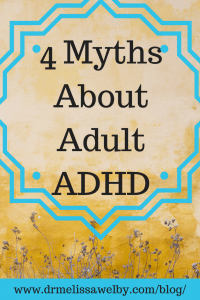ADHD myths can get in the way of people seeking treatment and contribute to the stigma against people with ADHD. According to the National Institutes of Health, approximately 4.4% of US adults have ADHD although less than 11% receive treatment. Myths and stigma play a role in the huge discrepancy between the number of people with ADHD and the number with ADHD that receive treatment. Adult ADHD can cause significant challenges in relationships, employment, and self-esteem for people who are not adequately treated.
Are you concerned that ADHD may impact you or your loved one? Take this free online test now: Click here
Conventional wisdom used to say the majority of people with childhood ADHD will outgrow it. However, the truth is that up to 85% of children with ADHD continue to experience significant symptoms into adulthood. Hyperactive and impulsive behaviors may decrease with age; but restlessness, distractibility, and inattention often continue into adulthood.
Adult ADHD Myth #1: Most adults grow out of ADHD
Executive functioning (the ability to plan, get organized, and manage time) is often impaired in adults with ADHD who frequently struggle with prioritizing and managing daily activities. Executive functioning deficits can significantly impair academic and career success.
ADDitude magazine describes executive functioning deficits in adult ADHD as:
“When a person’s executive functions fail, he has trouble analyzing, planning, organizing, scheduling, and completing tasks. People with EFD commonly lack the ability to handle frustration, start and finish tasks, recall and follow multi-step directions, stay on track, self monitor, and balance priorities. Fixing the area of deficit is key to fixing academic or occupational difficulties. Common signs and symptoms of EFD in adults include:
- Forgetting to complete tasks
- Inability to keep track of personal items like keys and cell phones
- Trouble following conversations
- Losing train of thought
- Difficulty remembering steps in a multi-step processes
- Inability to remember names
- Often late
- Problems breaking big projects into steps
- Trouble meeting deadlines
- Unable to multitask
- Difficulty remembering abbreviations and acronyms”.
Individuals with ADHD can develop coping and organizing strategies that help manage and control symptoms. Some people are able to compensate for their ADHD by using coping strategies and don’t need medication. Others need medication in order to be organized enough to use the strategies that will help them.
Get a year of reminder prompts delivered monthly to your inbox.
I created a series of monthly email reminders so you don’t forget and lose sight of your goals. Get a year of prompts delivered monthly to your inbox. For FREE! These prompts will serve as a reminder to check-in and give you questions to walk through to assess your progress. Think of this as a built-in safety net to help you stop and reset if you need to.
To sign up for the monthly reminder prompts fill in your email here and they will be sent to you once each month.
Adult ADHD Myth #2: Adult ADHD isn’t a big deal. Get over it!
Many adults with ADHD struggle in work and relationships. ADHD can cause significant dysfunction in peoples live’s. This dysfunction can be minimized with treatment.
People with Adult ADHD can struggle with:
- Paying their bills on time,
- Procrastination of tasks that aren’t engaging,
- Talking over people,
- Not being a good listener,
- Being forgetful,
- Impulsivity,
- Poor self-esteem resulting from a lifetime of feeling they can’t measure up or that they are “stupid”,
- Frequent feelings of shame and frustration,
- Emotional volatility and defensiveness,
- Chronic underachievement,
- Insecurity and depression.
The divorce rate with ADHD is higher than in the general population. The tendency for the partner with ADHD to become distracted is a constant source of conflict in relationships. Studies have shown a high level of distress in 60% of marriages where one spouse has ADHD. Adults with ADHD are twice as likely to get divorced.
As an aside: there is a great book written about the effect of ADHD on a marriage. This book not only explains what happens when a spouse has ADHD but also gives helpful tools necessary for the relationship to thrive. Here is an excerpt and explanation from the author of this book. [amazon_link asins=’B005MRBEAG’ template=’ProductAd’ store=’drmelissawelb-20′ marketplace=’US’ link_id=’66f2d060-0f1c-11e8-ace1-f17cd05e279e’]
This article talks about ADHD’s effect on parenting. A parent with ADHD may have challenges with self-regulation, motivation, and various cognitive processes. This can lead to issues where the parent has difficulty modeling effective behavioral control and emotional responsiveness to their children.
Adult ADHD Myth #3: ADHD is over-diagnosed
Many adults with ADHD never received the diagnosis as children. In the past, ADHD wasn’t identified unless people were disruptive enough to necessitate an evaluation. Parents, whose children get diagnosed with ADHD, often then recognize the signs in themselves.
The inattentive type of ADD is likely underdiagnosed. Often people with the inattentive form of ADD escape identification. They are generally not disruptive or hyperactive. Because they don’t call attention to themselves people may not notice they are underperforming. Also, if they are academically gifted, they may be able to get away with their disorganization and lack of executive functioning skills while in school. Sometimes ADHD isn’t identified until the person is struggling to get their work done in college, in their career, or having conflicts in their relationship.
People often think of ADHD as a male problem. This can lead to females with ADHD not being noticed. Females with ADHD are almost 2x as likely to have the inattentive form which makes it easier to miss.
ADHD Myth #4: ADHD isn’t real
ADD is a genetically inherited neurodevelopmental disorder. Family and genetic studies have shown ADHD to be the most heritable of psychiatric disorders. There are specific data that must be met for the diagnosis to be made. It is a brain-based condition that involves the neurotransmitters norepinephrine and dopamine.
ADHD isn’t moral failing, laziness, or caused by poor parenting and too much sugar. Chaotic and critical parenting can make it worse but it isn’t the cause of ADHD. ADHD is not created by an over-demanding and over-scheduled society.
Attention and focus exist on a spectrum
Attention and focus exist on a spectrum. Anyone can experience problems with attention and focus to some degree. However, in people with ADHD, the symptoms are so significant that they impair daily functioning.
These days, adult ADHD is accepted as a disorder which appears across the lifespan. There is a greater awareness of its existence and the challenges that can occur when it is not adequately treated.
Don’t fall for the myths surrounding ADHD. If you think you may be struggling with symptoms related to ADHD read more about the condition and go get evaluated.
Read more about ADHD:
Executive Functioning Skills: Do You Have Them?
The Ultimate Guide: 15 Tips to Improve Executive Function Disorder
Top Books on Executive Functioning Disorder
If you are looking for more health and wellness resources check out my Resources page or Mental Health Bookstore.
I recommend these books about ADHD: [amazon_link asins=’1138190748,0307743152,1538104520,1462507891,1590308476,0981548709′ template=’ProductCarousel’ store=’drmelissawelb-20′ marketplace=’US’ link_id=’0408d8fc-0eb8-11e8-82df-9dacfff9c2fd’]





This is fascinating. Thank you so much for sharing this important message.
I love this. So much information in one place. In fact after reading some of the issues/symptoms makes me wonder if I have it!
You wouldn’t think a pediatrician would address this issue, but I have many patients with parents who have ADHD (or suspected ADHD) who struggle. When the parent gets appropriately assessed and treated, family dynamics change for the better and then the child’s behavior improves. Treatment makes a big difference, not only for the adult, but for the whole family!
Yes!! A parent with untreated ADHD is going to have a hard time creating routine and structure that a child with ADHD will benefit from. So many adults end up being diagnosed after their children are diagnosed.
As someone, at 40, two kids, third on the way, with combined type ADHD, non-hemispherically dominant, and an IQ of 154(yes I know tmi). I would like to add a fifth myth of ADHD.
Myth number 5: medication is a cure of symptoms.
As I have grown with my ADHD I have gone from one medication to four. And from a realitively low dose to a frighteningly high dose.
That is a great comment! You are absolutely right medication isn’t a cure for symptoms. It certainly can make a huge difference tho but some people are more responsive than others.
I appreciate this information being out here but there is so much talk of diagnosis and that was never in question for my ADHD. My problem is finding help to in the areas of self starting and having to do boring crap at work that doesn’t interest me. I will be 30 this year, I’m divorced, have been miserably bored working as a journeyman electrician for the past 10 years and not moving forward in life. My prescription to Adderall has basically been my breakfast and lunch for almost 20 years now, as a child and as an adult. It’s clearly not the answer, only pleases the people in life I answer to but when do I get to be happy in life ya know?! Self-help says oh, just change everything, start a new routine but to do list is not the answer. Desperate for a better life!
You are right- there isn’t one answer that works for everyone. People aren’t “cookie-cutter” and that is why it can be so helpful to be working with someone you trust, and who is experienced with ADHD, to help you find a way around the things that have been obstacles in the past. Stimulants can be a great starting point so there is a chance to more consistently institute changes and strategies that can be helpful. Executive functioning challenges can make it so difficult and these are not necessarily treated by stimulants but by finding the right mix of strategies. Here’s one blog I wrote on this topic: https://drmelissawelby.com/executive-functioning-skills-do-you-have-them/